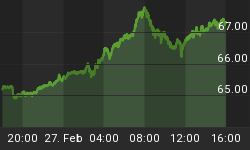Apparently full-year negative growth is unacceptable to Brazil's policymakers, even during the most severe global recession in a generation. They should tell that to Latvia who could contract by as much as 18% this year (not annualized), but I digress. Brazil's Copom (the monetary policy committee) voted 6-2 on Wednesday in favor of a 100bp cut to bring the Selic (main policy rate) to 9.25% - a historic low. The two dissenting members favored a more "modest" 75bp cut. Since the overwhelming majority of forecasters had also called for a more modest cut, it might be a worthwhile endeavor to dive into the details and see where the Copom's justification lies.
Because the Banco Central do Brasil operates an inflation-targeting regime, it only seems appropriate to start there. The bank's target is set at 4.5% (± 2 percentage points) for 2009-2010. As you can see from Chart 1, while year-over-year price increases are below the upper bound of the formal target (horizontal reference on chart), at 5.20% in May, inflation isn't exactly optimal or even at/below the actual target yet. As a policymaker, we would have reservations about continuing a trend of dramatic cuts when inflation has been merely moderating to just below the target maximum.
Chart 1
What is more, the recession in Brazil already appears to be moderating quite markedly. After a 3.6% plunge in real GDP in Q4 of last year (quarter-on-quarter), the country surprised again when it posted just a 0.8% contraction in Q1 2009. Not only does this send a signal of stabilization to the central bank, but it also hints that positive quarter-on-quarter growth could be achieved as early as Q2 and if not, then certainly by the third quarter. In fact, industrial production is already signaling the end of recession.
Chart 2
Add this together with Brazil's already increasing formal employment level and decreasing unemployment rate (one of the very few places in the world where this is happening), and you have the perfect cocktail of inflation-stoking demand pressures.
Chart 3
So what, you ask, is Copom doing lowering interest rates by more-than-expected to all-time lows in the face of clearly increasing demand-side price pressures? Before we answer that question, it should be known that the decision to cut by a hefty 100bps came only a day after Finance Minister (read: government official) Guido Mantega explicitly stated that the economy needed more fiscal and monetary stimuli to achieve positive growth for the year as a whole. Coincidence? Maybe, but now we at least have something to blame for all being surprised to the upside. But make no mistake about it, Brazil's autonomous monetary policy committee is going for broke this year - its government says so.















